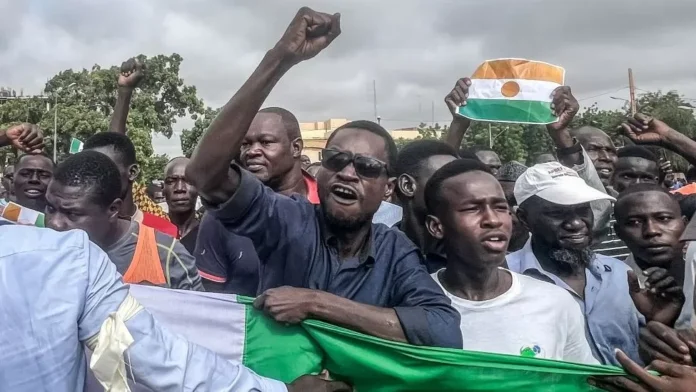Niger Coup Deadline Approaches: A Critical Moment for West Africa’s Decision-Making
As the seven-day ultimatum given by West African leaders for the military in Niger to reinstate President Mohamed Bazoum draws to a close, both sides have crucial decisions to make. The situation has escalated, with Ecowas imposing sanctions on the coup leaders and cutting off electricity supplies and borders, intensifying the standoff.
In this article, we delve into the possible scenarios that could unfold after the deadline passes, examining options such as extending the deadline, agreeing on a transition timetable, and the potential for military intervention. Our aim is to provide a comprehensive analysis that sheds light on the complexities of the situation and offers insights into how Niger and the region may navigate these turbulent times.
1) Extending the Deadline: A Diplomatic Move
One possible option is for the Ecowas leaders to extend the deadline. While this approach may be viewed as a climbdown, it offers an opportunity for the heads of state to save face by emphasizing diplomatic efforts and granting more time for negotiations. The challenge lies in the fact that previous Ecowas mediation efforts have not yielded significant results. A recent delegation’s visit to Niger proved unfruitful, leaving tensions high and limited progress made.
Adding to the complexity, the junta has escalated tensions by cutting diplomatic ties with several countries, including Nigeria, Togo, the US, and France. This move, coupled with President Bazoum’s situation as a “hostage” and his plea to the international community for assistance, has further complicated the resolution process.
2) Timetable for a Transition: Finding Middle Ground
In an attempt to de-escalate tensions and seek common ground, the junta and Ecowas could agree on a timetable for a return to democratic rule. Central to this approach would be the release of President Bazoum and other political detainees, a demand raised by those who have condemned the coup in Africa and beyond.
Past transitions in the Sahel region, such as in Mali and Burkina Faso, have faced challenges with continuously postponed election deadlines. Examining Sudan’s attempt to establish a mixed civilian-military government as a pathway to democracy also offers valuable lessons, given its subsequent descent into internal conflict among rival military leaders.
3) The Prospect of Military Intervention
While the West African leaders have not explicitly stated the use of force, they have left it open as a possibility. Nigerian officials have described it as a “last resort,” and President Tinubu mentioned the potential for military intervention to enforce the military junta’s compliance.
Ecowas has previously employed military force to restore constitutional order, such as in The Gambia in 2017 when Yahya Jammeh refused to step down after losing an election. However, intervening in Niger presents a distinct challenge due to its vast geographical size compared to The Gambia.
Additionally, Nigeria, leading the charge to reinstate President Bazoum, faces its own security challenges at home, making it a strategic gamble to send a significant portion of its army to Niger. Moreover, both Mali and Burkina Faso have warned that military intervention in Niger could be considered a “declaration of war,” and they would stand in defense of their fellow coup leaders.
The potential for escalation into a full-scale regional war raises concerns, especially if the Niger population resists foreign intervention. Algeria, Niger’s neighbor to the north, along with other countries like China and Russia, has advocated for restraint and continued dialogue to ease tensions.
Despite these challenges, Ecowas defense chiefs have developed a detailed plan for military intervention, and Nigeria, Ivory Coast, Senegal, and Benin have expressed readiness to send troops if deemed necessary. However, the decision to deploy troops requires careful consideration of the potential consequences and the pursuit of peaceful solutions whenever possible.
Striving for a Peaceful Resolution
For all parties involved, a peaceful resolution is undoubtedly the preferred outcome. Ecowas, with a mandate to prevent further coups in the region, seeks to demonstrate its resolve in resolving political crises. As the deadline approaches, the world watches closely, hopeful for a solution that preserves democratic principles and stability in Niger.
The geopolitical dynamics, historical ties, and ethnic connections between Nigeria and Niger play a significant role in shaping potential outcomes. The decisions made in the coming days will reverberate throughout the region and may have lasting implications for West Africa’s stability and unity.
In conclusion, the Niger political crisis presents a complex and multifaceted challenge. The decisions taken by Ecowas, the military junta, and other regional powers will shape the trajectory of the situation. It is vital for all stakeholders to engage in constructive dialogue, prioritize the restoration of constitutional order, and seek peaceful solutions to the crisis.
As we navigate these uncertain times, we must recognize that achieving stability in Niger goes beyond the actions of individual leaders; it requires a collective effort from the entire international community. The resolution of the crisis will serve as a litmus test for the efficacy of regional bodies like Ecowas in ensuring democracy and safeguarding against political upheavals. Deadline








[…] Niger Coup Deadline Approaches: A Critical Moment for West Africa’s Decision-Making […]